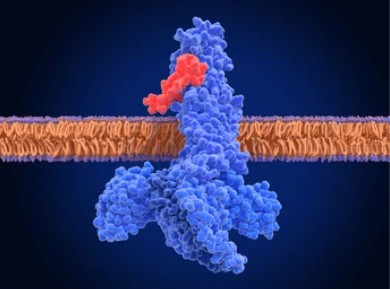Peptide Hormone G Protein-Coupled Receptors
Related Symbol Search List
Immunology Background
About Peptide Hormone G Protein-Coupled Receptors
Peptide Hormone G Protein-Coupled Receptors are part of the family of G protein-coupled receptors (GPCRs), a group of widely distributed receptor proteins involved in regulating cellular perception and transmission of external signals. Peptide hormone G protein-coupled receptors (Peptide hormone GPCRs) are a subclass of the GPCR family characterized by interactions with peptide hormones as ligands that regulate a variety of physiological functions and metabolic processes. These receptors have a specific structure on the cell membrane, containing seven transmembrane structural domains, and are therefore also known as seven times transmembrane receptors.
Peptide hormones are biologically active molecules composed of short-chain amino acids that play important roles in physiological processes. These hormones are secreted in an endocrine manner from endocrine glands or other cells, delivered to target cells via the bloodstream or other body fluids, and bind to peptide hormone G protein-coupled receptors. The binding of the peptide hormone to the receptor triggers a series of intracellular signaling events that ultimately lead to specific physiological responses within the cell.
Peptide hormone G protein-coupled receptors play key roles in many physiological functions. They are involved in the regulation of processes such as growth, appetite and energy metabolism, cardiac function, stress, and reproductive physiology. By binding to ligands, these receptors activate intracellular G proteins, which in turn initiate complex cellular signaling pathways, such as adenylate cyclase, phospholipase C, and ion channels, to regulate cellular functions and physiological responses.
The study of peptide hormone G protein-coupled receptors is important for gaining insights into their roles in health and disease, as well as for the development of related drugs. By exploring the structure, ligand recognition mechanisms, and signaling pathways of these receptors, scientists can reveal their roles in physiological regulation and search for novel therapeutic strategies targeting these receptors.
Mechanism of Action of Peptide Hormone G Protein-Coupled Receptors
Peptide hormone GPCRs function through a canonical mechanism involving G protein activation and subsequent intracellular signaling cascades. When a peptide hormone binds to the receptor, it induces conformational changes that activate heterotrimeric G proteins. The activated G proteins then modulate downstream signaling effectors, such as adenylyl cyclase, phospholipase C, and ion channels, leading to various cellular responses.

Functions of Peptide Hormone G Protein-Coupled Receptors
Peptide hormone GPCRs are involved in numerous physiological processes and exhibit diverse functions, including:
- Endocrine Regulation
Peptide hormone GPCRs play a crucial role in endocrine regulation by mediating the effects of peptide hormones. They regulate hormone release, hormone synthesis, and modulate endocrine signaling pathways involved in processes such as metabolism, growth, and reproduction.
- Metabolic Control
Certain peptide hormone GPCRs are involved in the regulation of metabolic processes, including glucose homeostasis, appetite control, and energy expenditure. They influence insulin secretion, regulate food intake, and modulate lipid metabolism.
- Cardiovascular Function
Peptide hormone GPCRs are key regulators of cardiovascular function. They modulate heart rate, blood pressure, vascular tone, and cardiac contractility, contributing to the regulation of cardiovascular homeostasis.
- Neurotransmission and Neuroendocrine Signaling
Peptide hormone GPCRs are involved in neurotransmission and neuroendocrine signaling. They modulate neuronal activity, neurotransmitter release, and regulate the secretion of neuropeptides, affecting various aspects of brain function and behavior.
Available Resources for Peptide Hormone G Protein-Coupled Receptors
Peptide hormone G protein-coupled receptors play a critical role in mediating the effects of peptide hormones and are involved in diverse physiological processes. Creative BioMart provides a wide range of products and services related to peptide hormone GPCRs, including recombinant proteins, cell and tissue lysates, protein pre-coupled magnetic beads, assay kits, and custom services, to support researchers in their studies on the mechanisms, functions, and ligands of peptide hormone GPCRs, contributing to our understanding of their significance in health and disease. The following peptide hormone G protein-coupled receptors are displayed, click to view all related molecules/targets and research reagents. Please feel free to contact us with any questions or requests.
Reference:
- Trumpp-Kallmeyer S, Chini B, Mouillac B, et al. Towards understanding the role of the first extracellular loop for the binding of peptide hormones to G-protein coupled receptors[J]. Pharmaceutica Acta Helvetiae, 1995, 70(3): 255-262.

